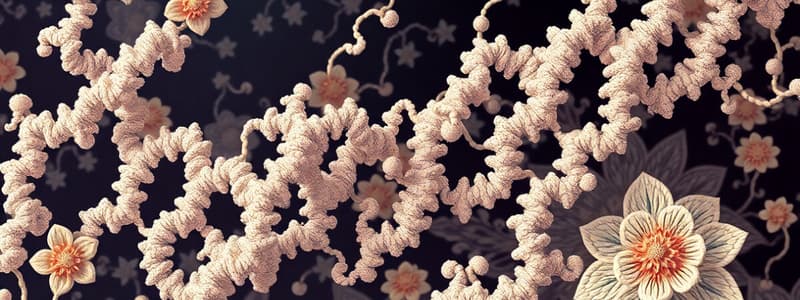Podcast
Questions and Answers
What is the primary focus of the described three-dimensional spatial arrangement?
What is the primary focus of the described three-dimensional spatial arrangement?
- The bonding between amino acids in proteins
- The linear sequence of amino acids in a protein
- How secondary structural features relate to one another (correct)
- The influence of temperature on protein structure
Which secondary structural feature is NOT mentioned in the content?
Which secondary structural feature is NOT mentioned in the content?
- Folds (correct)
- Loops
- Helices
- Sheets
What type of structural features does the concept primarily deal with?
What type of structural features does the concept primarily deal with?
- Quaternary interactions between multiple proteins
- Secondary structures such as helices and sheets (correct)
- Tertiary structures formed by amino acid interactions
- All structural features at the molecular level
What do the domains in the three-dimensional space relate to?
What do the domains in the three-dimensional space relate to?
Which of the following best describes the relationship between secondary structural features and domains?
Which of the following best describes the relationship between secondary structural features and domains?
What primarily maintains the tertiary structure of proteins?
What primarily maintains the tertiary structure of proteins?
Which statement accurately reflects how tertiary structure is influenced?
Which statement accurately reflects how tertiary structure is influenced?
An important factor for maintaining a protein's tertiary structure is:
An important factor for maintaining a protein's tertiary structure is:
Why is the aqueous solvent important for a protein's tertiary structure?
Why is the aqueous solvent important for a protein's tertiary structure?
Which aspect is NOT a factor in the maintenance of protein tertiary structure?
Which aspect is NOT a factor in the maintenance of protein tertiary structure?
Flashcards
Protein 3D Structure
Protein 3D Structure
How secondary structures (helices, sheets, bends, turns, loops) arrange to create domains and how they relate to each other in space.
Secondary Structures
Secondary Structures
Parts of a protein's chain (e.g., alpha-helices, beta-sheets) forming repeated patterns.
Domains
Domains
Organized, independent units of a protein, formed by secondary structures.
Spatial Relationships
Spatial Relationships
Signup and view all the flashcards
Protein Assembly
Protein Assembly
Signup and view all the flashcards
Tertiary structure
Tertiary structure
Signup and view all the flashcards
Side chain interactions
Side chain interactions
Signup and view all the flashcards
Aqueous solvent role
Aqueous solvent role
Signup and view all the flashcards
Protein Folding
Protein Folding
Signup and view all the flashcards
Amino Acid Interactions
Amino Acid Interactions
Signup and view all the flashcards
Study Notes
Amino Acids & Proteins
- Amino acids are building blocks of proteins
- Proteins' primary structure is the linear sequence of amino acids
- Primary structure is determined by DNA's central dogma (DNA to mRNA to codons to amino acids)
- Post-translational modifications occur after the protein is synthesized
- Misfolded proteins contribute to diseases like Alzheimer's and Parkinson's
- Protein structure is organized into four levels: primary, secondary, tertiary, and quaternary
- Primary structure: linear amino acid sequence held together by covalent peptide bonds
- Secondary structure: regular patterns of folding (alpha-helix and beta-pleated sheets) stabilized by hydrogen bonding
- Alpha-helix: right-handed spiral, hydrogen bonds between amino acids
- Beta-pleated sheet: polypeptide chains align side-by-side, hydrogen bonds between chains
- Tertiary structure: three-dimensional structure formed by interactions between amino acid side chains (R-groups) – hydrophobic interactions, hydrogen bonds, ionic bonds (salt bridges), and disulfide bonds.
- Quaternary structure: arrangement of multiple polypeptide chains (subunits) held together by non-covalent interactions
- Two types of quaternary structures: homogeneous (identical subunits) and heterogeneous (non-identical subunits)
- Protein denaturation: unfolding and disorganization of a protein's three-dimensional structure; doesn't affect primary structure; can be reversible or irreversible.
- Factors that cause denaturation: heat, pH changes, chemicals, and some detergents.
- Denatured proteins lose their function
Protein Structure
- Proteins are made of amino acids
- Primary structure is the amino acid sequence
- Secondary structure involves alpha-helices and beta-pleated sheets
- Tertiary structure results from interactions between amino acid side chains
- Quaternary structure involves several polypeptide chains
Studying That Suits You
Use AI to generate personalized quizzes and flashcards to suit your learning preferences.




